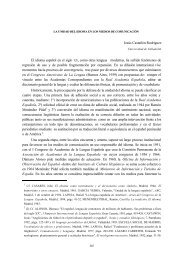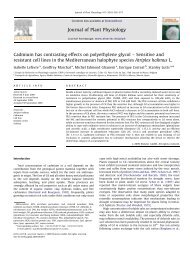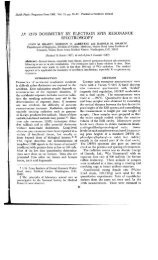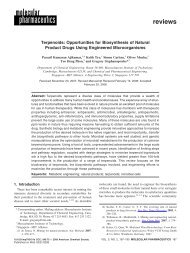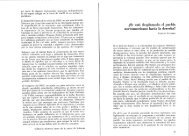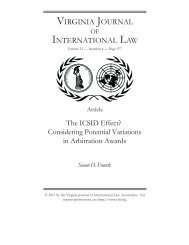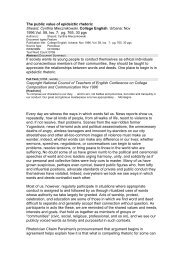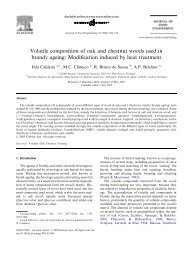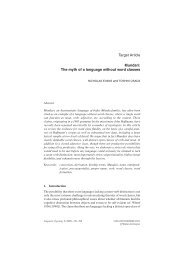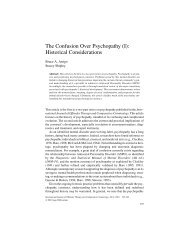Catullus 64 and the Conflict between A mores and Virtutes
Catullus 64 and the Conflict between A mores and Virtutes
Catullus 64 and the Conflict between A mores and Virtutes
Create successful ePaper yourself
Turn your PDF publications into a flip-book with our unique Google optimized e-Paper software.
212 SHERRON E. KNOPP<br />
Parcae coeperunt edere cantus" (306). At <strong>the</strong> same time as <strong>the</strong>y corroborate<br />
<strong>Catullus</strong>' opinion of Peleus' good fortune, <strong>the</strong> Parcae offer an even stronger<br />
warning for him than <strong>the</strong> marriage bedspread; <strong>and</strong> <strong>the</strong> first two lines of<br />
<strong>the</strong>ir song explain <strong>the</strong> need for <strong>the</strong> warning: "o decus eximium magnis<br />
uirtutibus augens, / Emathiae tutamen, Opis carissime nato" (323-24).<br />
Emathiae tultamen picks up <strong>the</strong> epi<strong>the</strong>t Thessaliae columen with which<br />
<strong>Catullus</strong> introduced Peleus <strong>and</strong> recalls his status as a hero. More important,<br />
he is called "decus eximium magnis uirtutibus augens." On <strong>the</strong> face of it,<br />
<strong>the</strong> address honors him, <strong>the</strong> ideal can be ennobling; but <strong>the</strong> poem has<br />
shown that heroism does not mix well with love, <strong>and</strong> <strong>the</strong> Parcae will make<br />
<strong>the</strong> point unmistakably clear by showing <strong>the</strong> ultimate progress of uirtutes<br />
at <strong>the</strong> cost of a<strong>mores</strong>.<br />
The stanzas about Achilles begin neutrally enough with a description of<br />
his courage <strong>and</strong> swiftness, followed by a reference to <strong>the</strong> Trojan War, in<br />
which "non illi quisquam bello se conferet heros" (343). The third stanza<br />
ironically places his "egregiae uirtutes claraque facta" (348) next to <strong>the</strong><br />
weeping mo<strong>the</strong>rs whose sons he will have killed; <strong>the</strong> fourth chronicles <strong>the</strong><br />
slaughter as Achilles proceeds "uelut densas praecerpens messor aristas"<br />
(353), <strong>and</strong> <strong>the</strong> fifth again ironically refers to heaps of corpses choking <strong>the</strong><br />
rivers as magnae uirtutes (357). The last two stanzas climax <strong>the</strong> carnage<br />
with a description of Polyxena, a testis to <strong>the</strong> deeds of <strong>the</strong> hero (362), whose<br />
innocent blood is required to crown <strong>the</strong>m. All toge<strong>the</strong>r <strong>the</strong>y make a grisly<br />
portrait of magnae uirtutes.<br />
Immediately following <strong>the</strong> vision of <strong>the</strong> truncum corpus of Polyxena atop<br />
<strong>the</strong> grave of Achilles, <strong>the</strong> idvllic love of Peleus <strong>and</strong> Thetis is recalled:<br />
"quare agite optatos animi coniungite a<strong>mores</strong>. / accipiat coniunx felici<br />
foedere diuam, / dedatur cupido iam dudum nupta marito" (372-74).<br />
The effect is <strong>the</strong> same as that produced earlier when <strong>Catullus</strong> followed <strong>the</strong><br />
promise of heroum. . . uirtutes with <strong>the</strong> desolation of Ariadne, <strong>and</strong> <strong>the</strong><br />
purpose is <strong>the</strong> same. Although Peleus <strong>and</strong> Thetis for <strong>the</strong> moment lack<br />
nothing in <strong>the</strong>ir love, <strong>the</strong>y could end up as Achilles <strong>and</strong> Polyxena will, or as<br />
Theseus <strong>and</strong> Ariadne have-or, on <strong>the</strong> o<strong>the</strong>r h<strong>and</strong>, as Ariadne <strong>and</strong> lacchus<br />
probably will. For <strong>the</strong> moment, <strong>the</strong>v remain poised precariously.<br />
The poem, <strong>the</strong>n, presents a consistent <strong>and</strong> coherent picture of <strong>the</strong> heroic<br />
age with its built-in tension <strong>between</strong> a<strong>mores</strong> <strong>and</strong> uirtutes. In <strong>the</strong> epilogue<br />
<strong>the</strong> poet sets up a contrast <strong>between</strong> <strong>the</strong> past:<br />
<strong>and</strong> <strong>the</strong> present:<br />
praesentes namque ante domos inuisere castas<br />
heroum, et sese mortali ostendere coetu,<br />
caelicolae nondum spreta pietate solebant<br />
omnia f<strong>and</strong>a nef<strong>and</strong>a malo permixta furore<br />
iustificam nobis mentem auertere deorum.<br />
quare nec talis dignantur uisere coetus,<br />
nec se contingi patiuntur lumine claro.<br />
This content downloaded by <strong>the</strong> authorized user from 192.168.72.223 on Tue, 11 Dec 2012 08:26:13 AM<br />
All use subject to JSTOR Terms <strong>and</strong> Conditions<br />
[384-86]<br />
[405-8]



